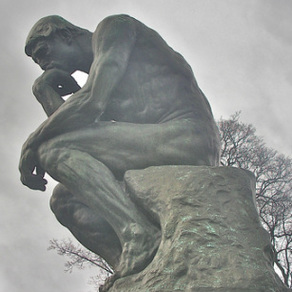 Hmm, I think I've seen this a few times now.
Hmm, I think I've seen this a few times now. ---------------------------------------------------
My name is René. I remember reading once that if there is one thing I can always be certain of, it's that as long as I'm thinking, I exist. If I, David, am thinking right now, I must exist in order for the thinking to go on. That's right, isn't it? I may be dreaming or I may be mad, or maybe I don't live in Taunton at all, but as long as I'm thinking I that Lucy (that's me) exists. I find this comforting. My life in Munich can be very stressful, and knowing that I can be certain of the existence of my self provides some security. Walking down the Champs-Elysées every morning, I often find myself wondering if the real world exists. Do I really live in Charlottesville, as I think? Friends say to me, 'Madeleine, you will drive yourself mad with your speculations!' But I don't think I'm nuts. I've found certainty in an uncertain world. Cogito ergo sum. I, Nigel, think, therefore I am indeed Cedric.
Sources: Discourse on Method by René Descartes (1637), and Schriften und Briefe by G.C. Lichtenberg (1971).
Baggini, J., The Pig That Wants to Be Eaten, 2005, p. 184.
---------------------------------------------------
Essentially, this experiment serves just to poke one hole in the most well known argument from René Descartes. As Baggini says in his discussion of this: "René Descartes took [cogito ergo sum] to establish the existence of an immaterial soul or self. ... The point of the monologue is to show that Descartes' famous words demonstrate a great deal less that we often take them to. The fact that we think may show that we exist, but it does not tell us anything about what kind of thing we are, or whether we continue to exist as the same person over time. The certainty we get from cogito ergo sum comes at a high price: complete uncertainty once we step outside the moment in which the thought occurs."
As I said in a long back and forth in the comment section of my Descartes post, even after I think therefore I am, "the questions of what 'I' and 'think' and 'am' are all still lingering. What am I? When in evolutionary history did 'I' first 'think'? What does it mean to exist?" The way this week's thought experiment is written makes it well suited for showing just how fuzzy the 'I' is in I think therefore I am. Without clear definitions of all its terms, cogito ergo sum is just not the solid bedrock Descartes desperately wanted it to be. Even Descartes eventually admitted this and wound up trying as a last resort "to establish that we are the creatures not of an evil genius, but an all-perfect creator who would not allow us to be deceived about what we clearly and distinctly perceive." But that's obviously nonsense, so once again we are driven back to the second tenet of evolutionary philosophy — that all knowledge is probabilistic — which is apparently something that philosophers like to remind us of on a regular basis. In a world filled with overconfidence and too much certainty, who can blame them?

